Table of Contents
There are many myths about them. Over the years of their existence, they have found supporters, but also opponents. We are talking about artificial sweeteners. Please read this article before condemning them as harmful or dangerous. We will discuss in detail all the key facts about artificial sweeteners. You will learn how they were made, whether they are safe and what their advantages and disadvantages are.
What are artificial sweeteners?
Artificial sweeteners are dietary supplements that are used as sugar substitutes. They give a sweet taste to drinks and meals and are even several times sweeter than sugar. Their advantage, however, is that they contain little or no calories. In addition, as a sugar substitute, they are suitable for people suffering from obesity and type 2 diabetes. They are a great alternative for baking, cooking and matching your favourite beverages. The term “artificial sweeteners” thus describes [2] [3]:
- sugar substitutes
- low-calorie sweeteners
- calorie-free sweeteners
Among the best-known artificial sweeteners are aspartame, saccharin, sucralose, and possibly acesulfame potassium. What are the differences between them? In the following lines, you will find all the necessary information about the 4 most used artificial sweeteners. [2]
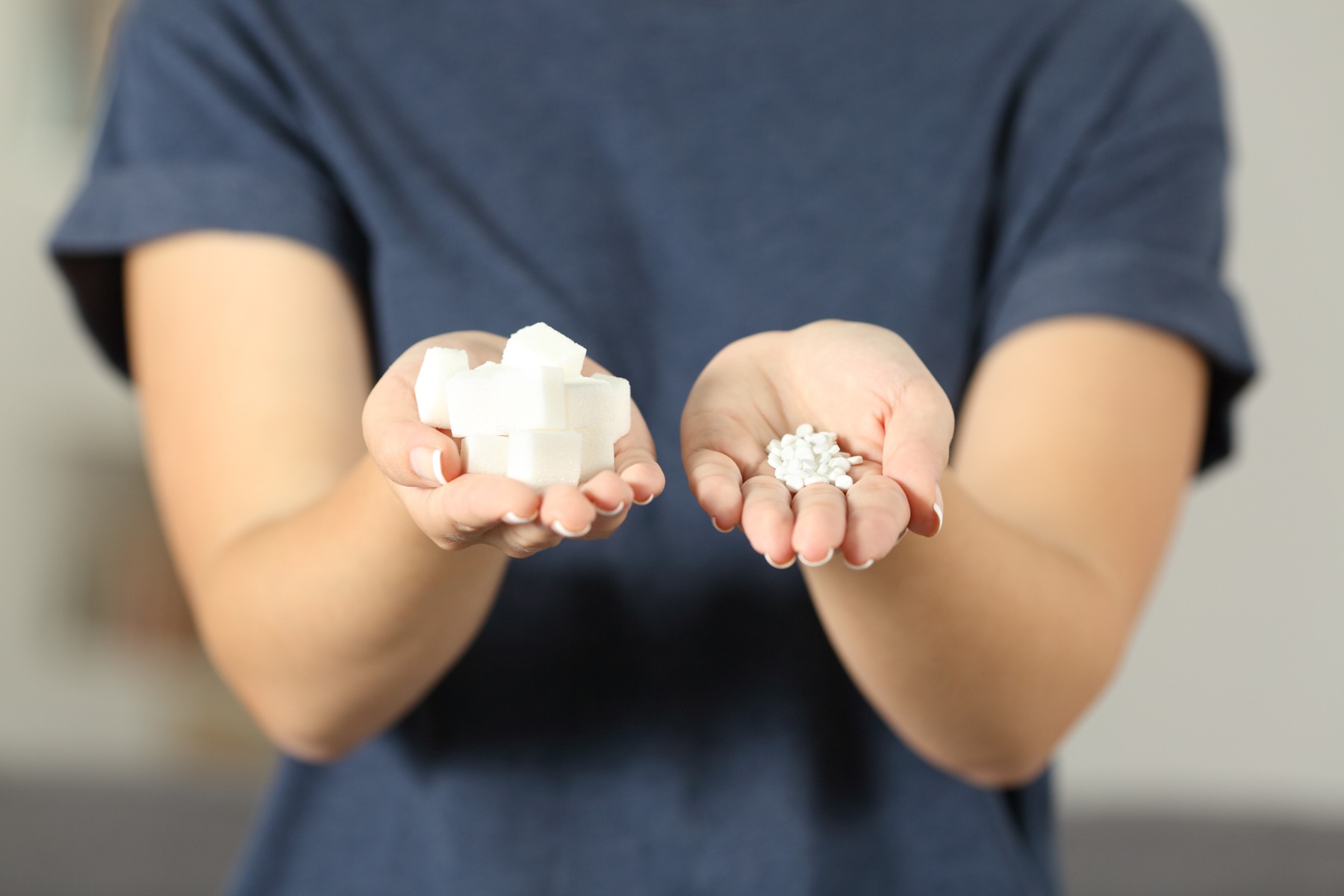
You might be interested in these products:
The most famous artificial sweeteners
Several artificial sweeteners can be found on the market, which differ in their properties but also in terms of use. As a food ingredient you can find them almost everywhere, so it is good to know them.
1. Saccharin
Saccharin is the oldest artificial sweetener, which in 1879 coincidentally discovered Constantine Fahlberg. After working all day in the lab, the young doctoral student did not wash his hands, and while eating his roll bunny he realized that it tasted sweeter. This was due to the remains of coal tar coming from his hands to the pastry, resulting in saccharin. [1]
Saccharin is about 300 times sweeter than table sugar. Colourful bags of saccharin can be found in cafes too. As a constituent of other foods, saccharin is found in chewing gum, diet drinks, jams and cosmetics. [4] [5]
In the 1970s, saccharin was classified as dangerous. Later, however, more than 30 studies confirmed its safety for humans. Thanks to these studies, it is on the market today and is one of the most popular artificial sweeteners. [6]
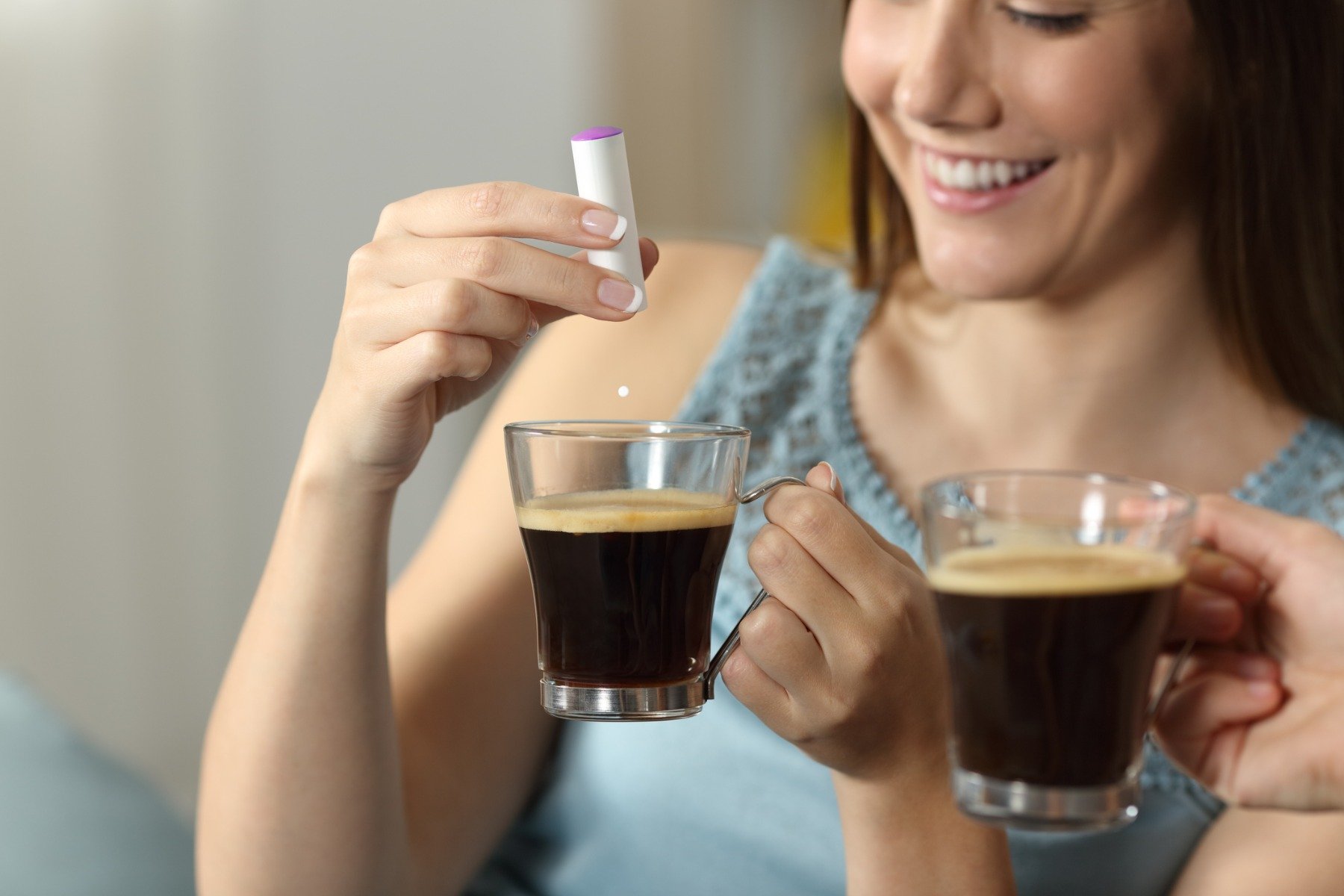
2. Aspartame
In 1965, aspartame was also discovered accidentally by chemist James Schlatter, who licked his finger as he lifted a sheet of paper. [7] It first appeared on the market in 1974. From a chemical point of view, aspartame is made up of two amino acids. It is 220 times sweeter than regular table sugar and is therefore used in sweetened drinks, chewing gums, but also in cereals. The disadvantage is that it cleaves at high temperatures and is therefore not suitable for baking. The FDA approved the use of aspartame in food and drink in 1996. More than 100 laboratory and clinical studies preceded this. [13] [4] [5] [6]
Myths about aspartame
1. Aspartame and cancer
Aspartame has been the subject of several myths that have been refuted. One of the best-known claims that aspartame increases the risk of cancer. According to an official statement by the National Institute for Cancer Research (NIC), aspartame does not enter the bloodstream and has no effect on the organs. In 2007, a large-scale study was conducted that failed to establish a link between aspartame and cancer. [12] [15]
2. Aspartame and diabetes
Another known myth claims that aspartame causes glucose intolerance and diabetes. Associations such as the FDA, the American Diabetic Association, and the American Heart Association have declared that normal consumption of aspartame has no effect on glycaemic index or appetite. A study was conducted in 2014 to determine if aspartame has an effect on blood sugar. The results showed no changes in sugar levels during consumption. [12] [16]
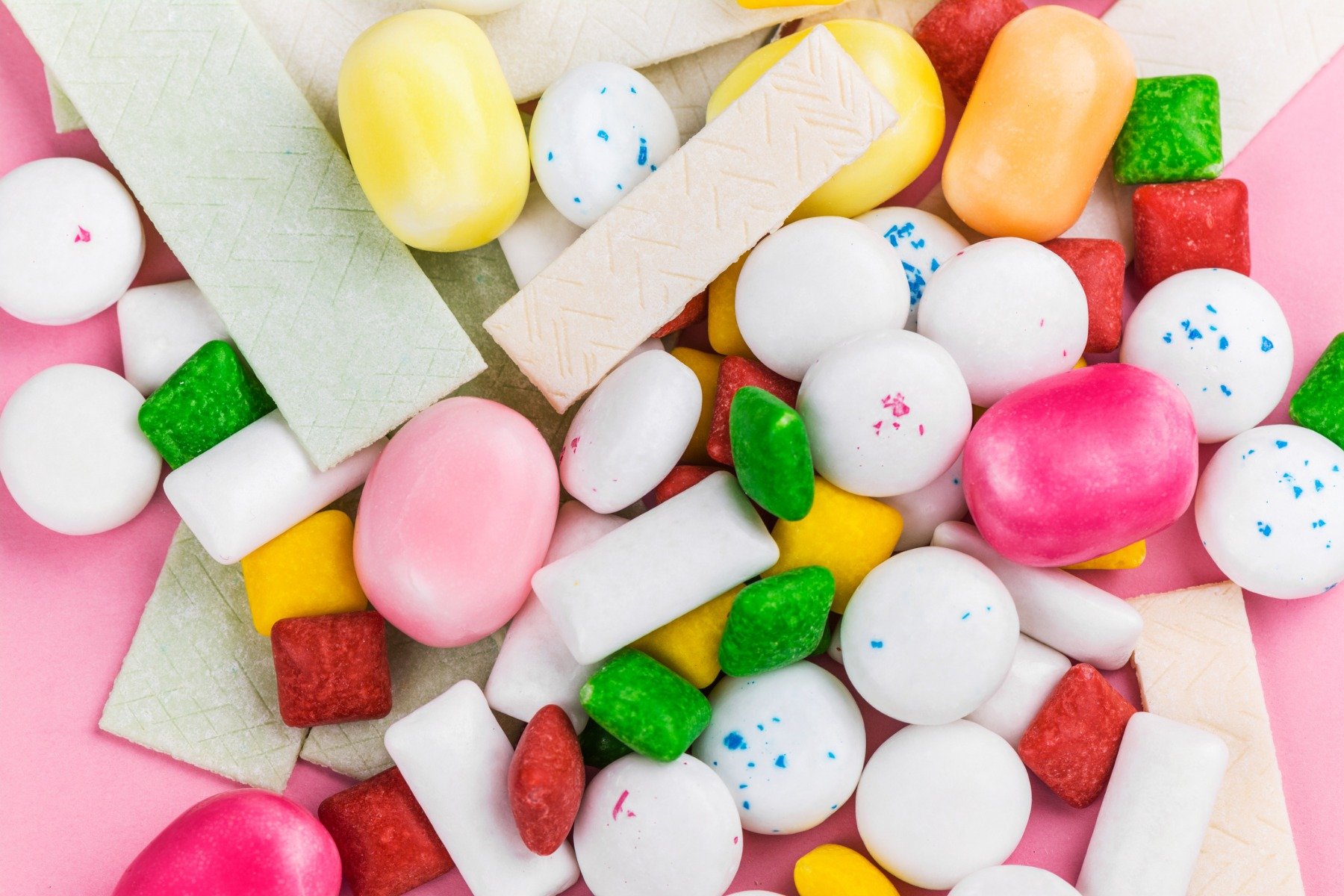
3. Aspartame and weight gain
Aspartame is said to cause weight gain, at least that’s what another myth claims. However, numerous studies confirm that it does not cause weight gain. On the contrary, it can promote weight loss as a substitute for sugar in high-calorie foods. The myths that artificial sweeteners produce a greater sweet taste are not supported by evidence.
A 2012 study examined 4 different drinks and their impact on body fat storage. One was a sugar-sweetened drink, the other was an aspartame-sweetened drink, the third was a semi-skimmed milk and a fourth water. The results of the aspartame beverage were very similar to those of water. This means that aspartame does not cause weight gain or increase in body fat. [12] [16]
4. Aspartame and headaches
Aspartame causes headaches. Another myth about aspartame, which the study proved to be false. The research was conducted on people who reported repeated headaches after consuming aspartame. Scientists used the blind tasting method. 35% of the participants had headaches after taking aspartame, but 45% had headaches after placebo. [14]

3. Sucralose
Sucralose was discovered in 1976. Its discovery is due to a scientist who misunderstood the instructions given. In foods, sucralose occurs quite frequently. It can be found in yoghurts, diet drinks or syrups. [4] [5] [8]
Sucralose arises from a multi-step chemical process from sugar. It is about 600 times sweeter than table sugar and is calorie-free. Its key advantage is resistance to high temperatures and is therefore used for baking or sweetening hot drinks. [4] To learn more about sucralose, read our article – Sucralose – an artificial sweetener and its impact on health.
4. Acesulfame potassium
Potassium acesulfame is approximately 200 times sweeter than sucrose and hence classical sugar. Because of its bitter aftertaste, it is often combined with other sweeteners such as aspartame or saccharin.
Are you wondering if Ace-K was discovered by chance as well? In fact, it was, by Carl Klauss in 1967. [4] [5] It has been officially approved since 1983 and its safety has been confirmed by more than 90 studies. Acesulfame potassium can be found in diet drinks, ice teas or pickled vegetables. [5] [6]
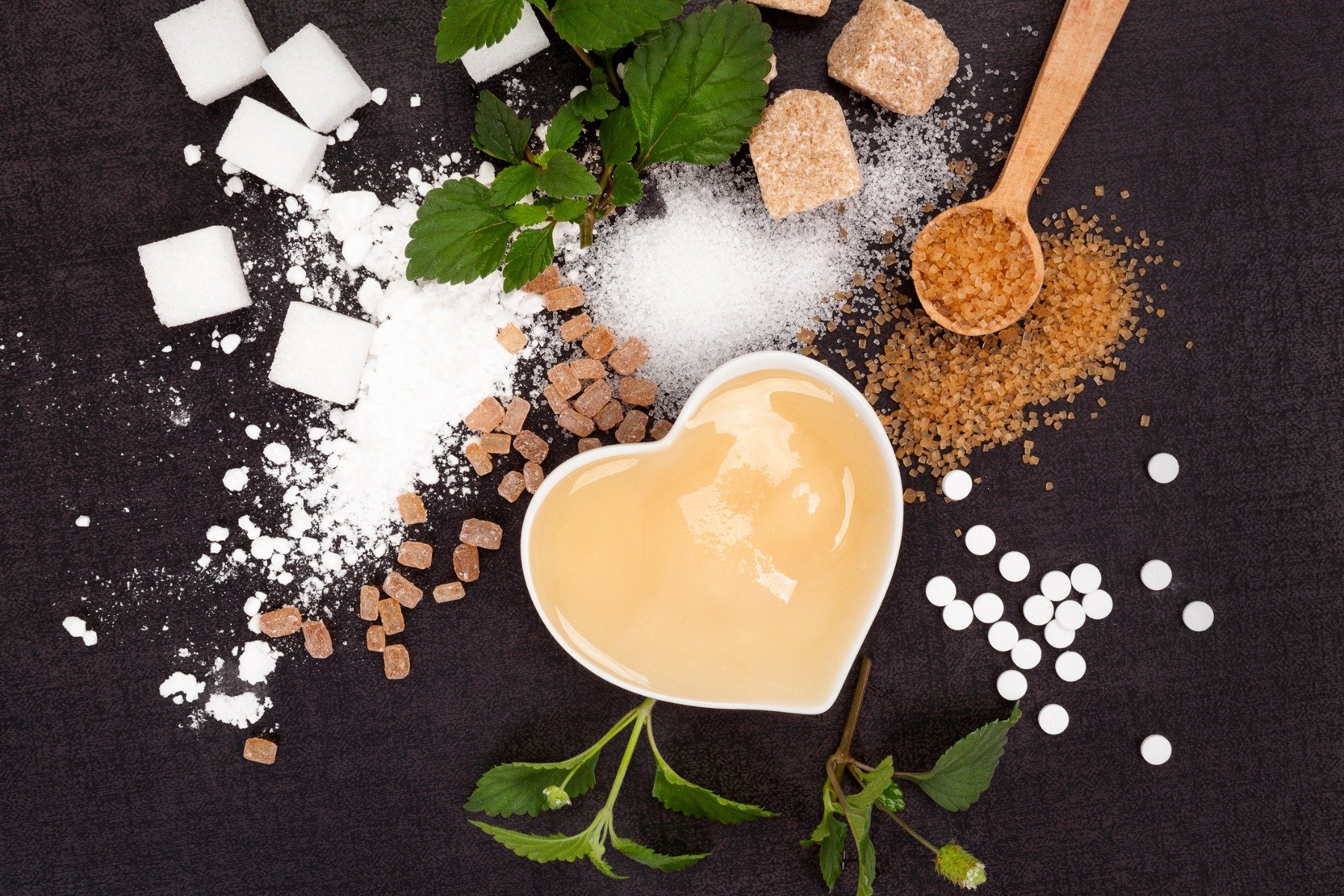
For better orientation in the differences between artificial sweeteners, here is the table:
| Acesulfame potassium | E 950 | 200x sweeter | sweetened drinks, ice teas, pickles | yes | 1967 |
| Aspartame | E 951 | 220x sweeter | sweetened drinks, chewing gums, cereals | no | 1965 |
| Saccharin | E 954 | 300x sweeter | chewing gums, diet drinks, jams, cosmetics | yes | 1879 |
| Sucralose | E 955 | 600x sweeter | yoghurts, sweet drinks, syrups | yes | 1976 |
Are artificial sweeteners harmful?
Where have doubts about artificial sweeteners come from? There are studies showing the harmful effects of artificial sweeteners. However, most of them have shortcomings. They were carried out on animals, using small samples, very high doses, or their results are statistically irrelevant. [17]
Thus, you don’t need to worry. The sweeteners available on the market are thoroughly investigated and their safety has been confirmed by many studies. It is not possible to market a new artificial sweetener without the approval of the competent authorities. Like other additives, sweeteners are subject to a safety assessment. In the European Union, the European Commission, the European Parliament and the Council of the European Union are responsible for the regulation of additives. The Commission and the Member States decide which additives will be used and in what quantities. They only work with relevant evidence to approve food safety. [18]
Extensive research has confirmed the safety of 6 low-calorie sweeteners in Europe and the US. These include aspartame, saccharin, sucralose, acesulfame potassium, but also neotame and stevia, which are natural substitutes for sugar. The recommended daily allowance was determined for each of these sweeteners. [17]
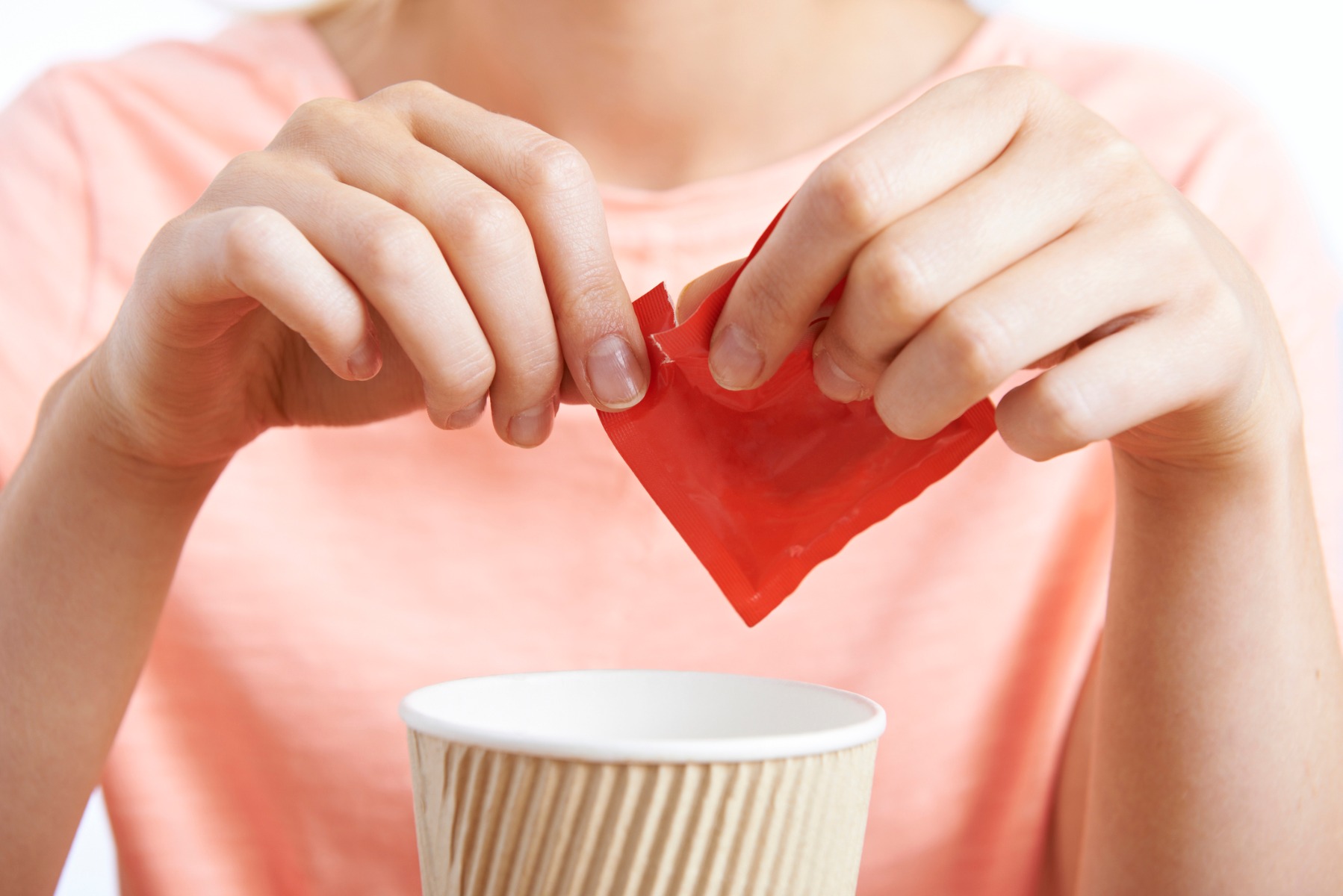
Daily allowance of artificial sweeteners
Like other dietary supplements, artificial sweeteners have a daily allowable dose, which is not recommended to be exceeded. The table below shows the optimum dose of the best-known artificial sweeteners [4]:
| Sucralose | 5 mg | 300 mg | 400 mg |
| Saccharin | 15 mg | 900 mg | 1200 mg |
| Acesulfame potassium | 15 mg | 900 mg | 1200 mg |
| Aspartame | 50 mg | 3000 mg | 4000 mg |

Side effects of artificial sweeteners
It is certainly worth mentioning the warning against aspartame use for people with specific diseases. Aspartame should be avoided by people suffering from a metabolic disorder of phenylketonuria and a neurological disease called delayed dyskinesia. Phenylketonuria is a genetic disease in which phenylalanine causes serious health problems.
Phenylalanine is not suitable for people suffering from delayed dyskinesia. This disease is a side effect of treating schizophrenia. Its content in aspartame may cause uncontrolled muscle movements typical of delayed dyskinesia. [9] [10] [11]
The disadvantage of some artificial sweeteners is their bitter aftertaste. To avoid this, manufacturers use different combinations of artificial sweeteners.
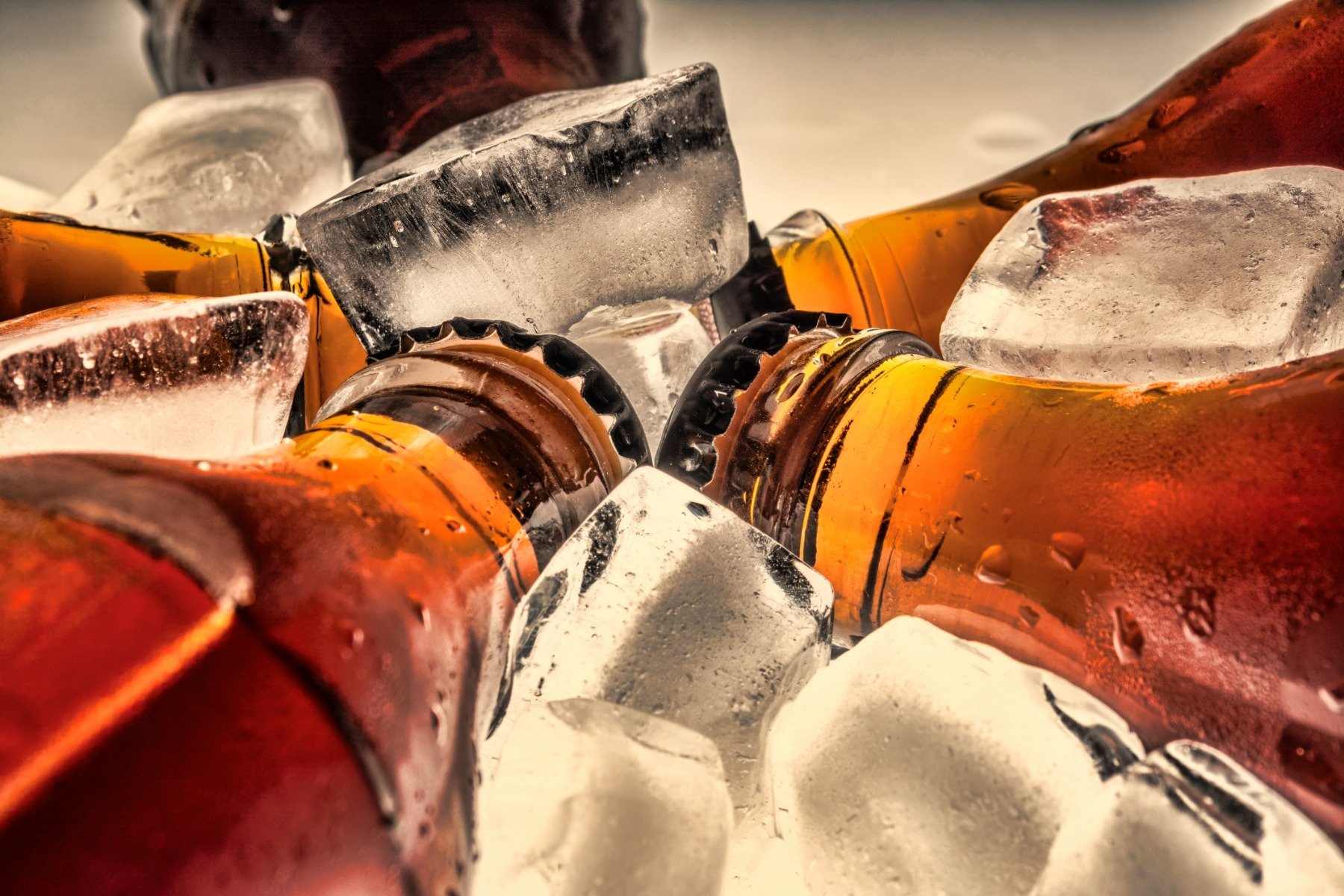
Another disadvantage is their baking and cooking properties. They are not the same as with sugar and therefore the baked product may be lighter or dense. Unlike sugar, artificial sweeteners cannot hold moisture. Therefore, pastry with artificial sweetener dries faster. [19]
New research is constantly emerging to verify the suitability of artificial sweeteners before they are placed in stores. Artificial sweeteners have their advantages and disadvantages. They may be a necessity for people with glucose intolerance. For those who want to lose weight, they are a very suitable alternative. They can therefore be beneficial for athletes too.
Did you learn all about artificial sweeteners with this article? Can you better recognize saccharin, aspartame and sucralose now? We hope you answered yes, and this article has been helpful to you. If you want your friends to know the truth about artificial sweeteners, don’t hesitate to share the article.
[1] Harald Sack - Ira Remsen and Saccharin – http://scihi.org/ira-remsen-saccharin/
[2] What are artificial sweeteners? – https://www.webmd.com/diabetes/qa/what-are-artificial-sweeteners
[3] Sanchari Chattopadhyay, Utpal Raychaudhuri, and Runu Chakraborty - Artificial sweeteners – a review – https://www.ncbi.nlm.nih.gov/pmc/articles/PMC3982014/
[4] Jenna Fletcher - What are the best sweeteners for people with diabetes? – https://www.medicalnewstoday.com/articles/323469.php
[5] The Skinny On Sweet: The Truth About 4 Common Artificial Sweeteners – https://www.bodybuilding.com/fun/skinny-on-sweet-the-truth-about-4-common-artificial-sweeteners.html
[6] Stevia and Sugar Substitutes – https://www.webmd.com/diet/stevia-sugar-substitutes#1
[7] Vinoy Shrivastava, Tabassum Zafar - Aspartame: Effects and Awareness – https://www.researchgate.net/publication/316545292_Aspartame_Effects_and_Awareness
[8] Hrefna Palsdottir - Sucralose (Splenda): Good or Bad? – https://www.healthline.com/nutrition/sucralose-good-or-bad
[9] Charlotte Lillis - What are the side effects of aspartame? – https://www.medicalnewstoday.com/articles/322266.php
[10] Katherine Zeratsky - My favorite diet soda has a warning about phenylalanine. Is phenylalanine bad for your health? – https://www.mayoclinic.org/healthy-lifestyle/nutrition-and-healthy-eating/expert-answers/phenylalanine/faq-20058361
[11] Natalie Butler - The Truth About Aspartame Side Effects – https://www.healthline.com/health/aspartame-side-effects
[12] Rosanne Rust - Debunking Myths on Aspartame, Part I – https://aspartame.org/debunking-myths-aspartame-part/
[13] Debunking 4 Myths About the Causes of Memory Loss – http://perceptabrain.com/blog/memory-loss-causes/
[14] Joe Cohen - Artificial Sweeteners: The Good, The Bad, & The Untrue – https://selfhacked.com/blog/interesting-facts-artificial-sweeteners/
[15] Artificial sweeteners do not increase cancer risk – https://www.cancerresearchuk.org/about-cancer/causes-of-cancer/cancer-controversies/do-artificial-sweeteners-cause-cancer
[16] Myth or Fact: Metabolic Syndrome. [https://caloriecontrol.org/myth-fact-metabolic-syndrome/
[17] Kirtida R. Tandel - Sugar substitutes: Health controversy over perceived benefits – https://www.ncbi.nlm.nih.gov/pmc/articles/PMC3198517/
[18] Sweeteners – https://www.efsa.europa.eu/en/topics/topic/sweeteners
[19] Crystal Ayres - 18 Advantages and Disadvantages of Artificial Sweeteners – https://connectusfund.org/7-advantages-and-disadvantages-of-artificial-sweeteners

